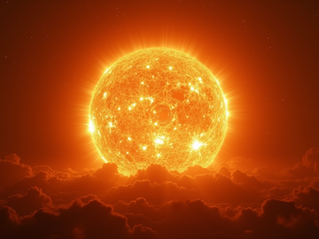Does the Universe Repeat Itself? Will Dead People be Reborn in the Future?
- Phystroid
- Mar 24, 2023
- 6 min read

The Big Bang is thought to have occurred 13.8 billion years ago. The Universe since then expands and our current models show that the rate of expansion is currently increasing exponentially.
Of course we don't have a theory of everything, which is essential in order to answer this question beyond any doubt. However, we can understand enough about fundamental laws of physics to be able to speculate. For example, time inside black holes and at the moment of the Big Bang should continue to flow there because if there was no time flow during the Big Bang, the Universe wouldn't start to expand.
Of course the idea of time is intimately related with the future and the past of the Universe. However it is not only time, it is also the second law of thermodynamics that it is well known that creates an arrow of time.
Ludwig Boltzmann, the theoretical physicist that is well known for his law of increasing entropy stated:
Ludwig Boltzmann's statement is in reference to the Second Law of Thermodynamics, which states that the entropy of a closed system tends to increase over time, leading to an increase in disorder and a decrease in the amount of available energy. In essence, this law implies that systems tend to move towards more probable states, which are characterized by higher entropy. Boltzmann's statement reflects the idea that it is impossible to construct a perpetual motion machine, which is a device that can operate indefinitely without an external energy source.
This is because, according to the Second Law of Thermodynamics, a perpetual motion machine would violate the law of entropy and create energy out of nothing. Boltzmann's work in statistical mechanics helped to establish the connection between the microscopic behavior of particles and the macroscopic properties of systems. His ideas laid the foundation for the development of statistical thermodynamics, which is a branch of physics that describes the behavior of systems composed of a large number of particles.
The Cyclic Universe
However, some scientists and philosophers have suggested that the Universe could be an exception to the Second Law of Thermodynamics. Some physicists and cosmologists have proposed the concept of a cyclic universe, which posits that the universe goes through an infinite cycle of expansion and contraction. According to this theory, the universe would repeat itself over and over again. One argument is that the Universe is not a closed system and is constantly exchanging matter and energy with its surroundings, so the law of entropy may not apply in the same way as it does for closed systems. Another argument is that the Universe is in a state of thermal equilibrium, which means that there is no temperature difference between different parts of the Universe. In such a state, there would be no energy gradient to drive the increase in entropy, and the Second Law would not apply in the same way.
The second law of thermodynamics like the vast majority of laws of physics is subject to review, and may not apply at the most extreme places in the Universe. In the future when new exotic physics will be discovered a very limited number of the current laws of physics will remain valid. For example, we would expect the law of conservation of energy to remain valid, despite the new laws of physics that will be discovered in the future. Of course entropy seems to increase over time, but the definitions of time that we are familiar with might not apply to the largest possible cosmic scale. The idea of infinite time seems unreasonable like the idea of any other infinite physical quantity. The solution to the problem of infinite time is to assume that the Universe has no way to track infinite time, and that the total time in the Universe has to be zero, according to the law of conservation of time. This law has never been proposed before, but keep reading this article to learn more about it.

Cosmology is the study of the Big Bang, and the evolution of the Universe. It is an exciting field of research. It has been revolutionised by theoretical models, as well as from the data of space telescopes like the HST.
Although today we might think that our Universe will keep expanding forever, this leads to a singularity: infinite space and time. There should therefore exist a maximum volume of expansion. Once this volume is reached the Universe will have no choice but to start contracting until it reaches the Big Crunch. A new Big Bang will follow and a new cycle will start. Time like space can't be infinite. However, this is true according to our everyday life definitions of time only. To be more precise the total time in the Universe has to be zero. That's true, the Universe probably has no clock that can track infinity.
Of course we are familiar with positive time because it is the Universe which we are living in. However, in the cosmic sense, we can regard the time of our mirror Universe arising from the contraction of space as negative. After our Universe reaches a maximum volume of expansion, space will start to contract and the clock of Universe which is based on the expansion of space rather than the movement of matter inside the space, will start to run backwards. Hence, the cosmic time will reset to zero when the Big Crunch occurs.
Of course the story doesn't end there. The question that arises is if the new Big Bang that will follow will be identical to ours, or if there will be a way for the Universe to track time with the mutations that arise from each consecutive new Big Bang? In this article we have hopefully already shed light deep into the unknown, however this question that arises, requires a whole new approach to the Universe to be answered, as it delves even more deep into the unknown intrinsic properties of the Universe. Nevertheless, we can safely postulate that according to the anthropic principle it is highly likely that the new Big Bang, should give rise to a new Universe where many constants of nature can take different values. The mutations arising from each new Big Bang will therefore consist a cosmic clock. It is a wild guess, however, even this clock might reset at some time into a default mode.
By exploring this ultimate cosmic clock of Big Bang mutations, with new physics that we will discover in the future we might be able to understand its complete cycle of Big Bangs. A well known way of thinking about the Universe is viewing it as an entity with total energy of zero. In this sense the Universe can be regarded as equal to nothingness at least from the point of view of matter and energy. The negative gravitational potential energy of space which is acquired upon the expansion of space balances exactly its positive energy and give us a net energy of zero. Perhaps, there is a similar point of view whereby there is negative and positive time which add up to zero.
This theory would solve the philosophical problem an infinite in time Universe or even a finite one. However, although more research is required to conclusively support this theory with observations and robust mathematics, it remains our only reasonable cosmological explanation able to address a multitude of logical problems that arise from infinities.
It is worth noting that the idea of a cyclic Universe is supported by many scientists, including the legendary physicist Roger Penrose.
Therefore to answer conclusively the question of: "If it is possible in the future that an identical Universe will be created, with identical people living in it and doing the exact same things", while it may seem beyond our reach, it is fair to say that it is highly likely that this is the case, especially by looking at arguments of time symmetry. A universe that is not time symmetrical appears ugly to me for some reason. If you would ask me what I would prefer, I would definitely vote for a Universe that doesn't repeat itself, as this would lead to suffering not being perpetuated. However, a Universe that is limited on time appears to be as unreasonable with a Universe that is has a net amount of positive energy in it. Let alone Universes with infinite space, time and energy. So while Einstein would have thought that the Universe might be infinite, we would definitely think that the Universe is closer to zero, from the point of view of energy, space, time or even consciousness. Einstein thought that: "Only two things are infinite, the universe and human stupidity, and I'm not sure about the former.", however even stupidity and consciousness, while they may not be physical quantities in the same way as energy or space are they almost certainly reset to zero at sometime in the Universe. However, stay tuned as this is a complicated topic worthy of separate discussion in our future magazine articles.




























